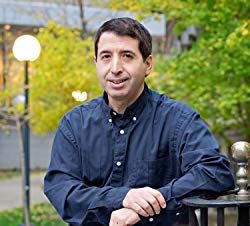We all know the words to John Lennon’s “Imagine”: An anthem of the peace movement, the song asks us to picture a world with no heaven and no hell – “Nothing to kill or die for / And no religion too…”
Would we really be better off in such a world? That question was the focus of a debate held recently at U of T, in which two of the university’s leading thinkers went head-to-head over the question of the “sacred.”
The event, featuring Ronald De Souza (philosophy) and Jordan Peterson (psychology), was called “Living Without the Sacred.” It was sponsored by the U of T Secular Alliance and the Centre for Inquiry.
Lennon’s song argues for doing away with religion – but for many people, religion is seen as necessary for moral grounding. How can we tell the difference between right and wrong once all the old “sacred” rules – the Bible, the Ten Commandments, and so on – are taken away? Are there secular “commandments” that can take their place? Or would we just be replacing one kind of “tyranny” with another?
De Souza argued that holding certain things sacred leads to absolutes – and that deeming anything as absolute causes trouble. Yes, people may bicker even without religion, he acknowledged; but “it’s only when you say ‘this is sacred’ that you’re prepared to kill.” The line drew much applause.
But wait a minute, countered Peterson. Aren’t we sure that some things really are better, or worse, than others? Can’t we say absolutely that the Holocaust was wrong?
And here the debate began to go off the rails.
When two people are having an argument, it’s often said that the first person to invoke Hitler or the Nazis has automatically lost. If this were true, then Peterson had lost.
Or had he? Surely we really can agree that what Hitler did was, in fact, absolutely wrong. Such facts, Peterson argued, are a necessary starting point for any discussion of right and wrong. He went on to describe some of the documented horrors of the Nazi Holocaust. “Auschwitz was absolutely wrong,” he declared. “Once we’ve said that, we have something to stand on.”
That sounds reasonable enough; obviously, we can all agree that the Holocaust was immoral and wrong by any measure. But De Souza had a comeback: Yes, we can be certain that what the Nazis did was wrong; but “the fact that something is true doesn’t make it sacred.”
Now it seemed to be an argument about words.
After some 90 minutes of this, I found myself mentally exhausted; toward the end, De Souza and Peterson seemed to be arguing about who hated Nazism more – hardly a productive line of inquiry.
Even so, the debate touched on some very relevant, perhaps urgent, questions. In our secular age, where does morality come from? Can science help us determine right from wrong in some objective way, as Sam Harris argues in his latest book, The Moral Landscape? Or did David Hume already nix that approach 250 years ago, when he argued that there is simply no way to derive “ought” from “is”? Hume argued that no amount of data regarding how the universe is can tell us how it ought to be. In other words, scientific facts, no matter how detailed, cannot be translated into moral or ethical laws. Or could moral truths simply be “out there,” in the way that mathematical truths seem to exist independently of the world and the people in it?
These are difficult, but legitimate questions. The debate fell far short of settling the matter, but it left the audience with some profound issues to wrestle with.
Recent Posts
U of T’s 197th Birthday Quiz
Test your knowledge of all things U of T in honour of the university’s 197th anniversary on March 15!
Are Cold Plunges Good for You?
Research suggests they are, in three ways
Work Has Changed. So Have the Qualities of Good Leadership
Rapid shifts in everything from technology to employee expectations are pressuring leaders to constantly adapt





